公共英语演讲
- 格式:pptx
- 大小:228.14 KB
- 文档页数:8
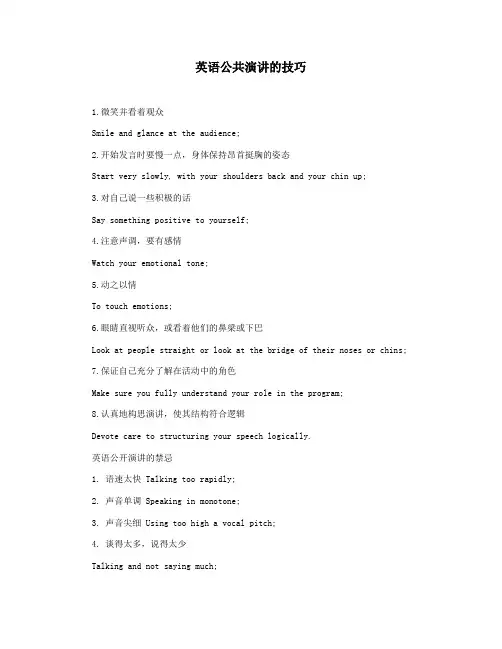
英语公共演讲的技巧1.微笑并看着观众Smile and glance at the audience;2.开始发言时要慢一点,身体保持昂首挺胸的姿态Start very slowly, with your shoulders back and your chin up;3.对自己说一些积极的话Say something positive to yourself;4.注意声调,要有感情Watch your emotional tone;5.动之以情To touch emotions;6.眼睛直视听众,或看着他们的鼻梁或下巴Look at people straight or look at the bridge of their noses or chins;7.保证自己充分了解在活动中的角色Make sure you fully understand your role in the program;8.认真地构思演讲,使其结构符合逻辑Devote care to structuring your speech logically.英语公开演讲的禁忌1. 语速太快 Talking too rapidly;2. 声音单调 Speaking in monotone;3. 声音尖细 Using too high a vocal pitch;4. 谈得太多,说得太少Talking and not saying much;5. 感情不充分Presenting without enough emotion or passion;6. 对观众采取一种居高临下的姿态Talking down to the audience;7. 夸张的词语使用得太多Using too many "big" words;8. 使用抽象概念而不给出事例加以说明Using abstractions without giving concrete examples;9. 使用别人不熟悉的技术术语Using unfamiliar technical jargon;10. 使用俚语或粗俗语Using slang or profanity;11. 演讲无组织,散乱无序Disorganized and rambling performance;12. 说话绕弯子,不切中主题Indirect communication , beating around the bush.英语公开演讲的“三的法则”1. 你的演讲包含三个部分The beginning, the middle and the end. Start to plan out what you will do in these three parts. The beginning is ideal for an attention grabber or for an ice breaker. The end is great to wrap things up or to end with a grand finale。
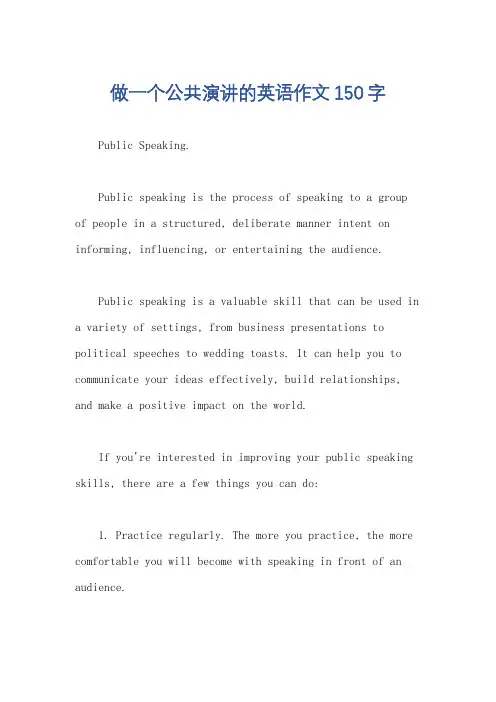
做一个公共演讲的英语作文150字Public Speaking.Public speaking is the process of speaking to a group of people in a structured, deliberate manner intent on informing, influencing, or entertaining the audience.Public speaking is a valuable skill that can be used in a variety of settings, from business presentations to political speeches to wedding toasts. It can help you to communicate your ideas effectively, build relationships, and make a positive impact on the world.If you're interested in improving your public speaking skills, there are a few things you can do:1. Practice regularly. The more you practice, the more comfortable you will become with speaking in front of an audience.2. Get feedback. Ask friends, family, or colleagues to give you feedback on your speeches. This can help youidentify areas where you can improve.3. Join a public speaking group. There are many public speaking groups available, such as Toastmasters, that can provide you with a supportive environment to practice your skills.中文回答:公众演讲。
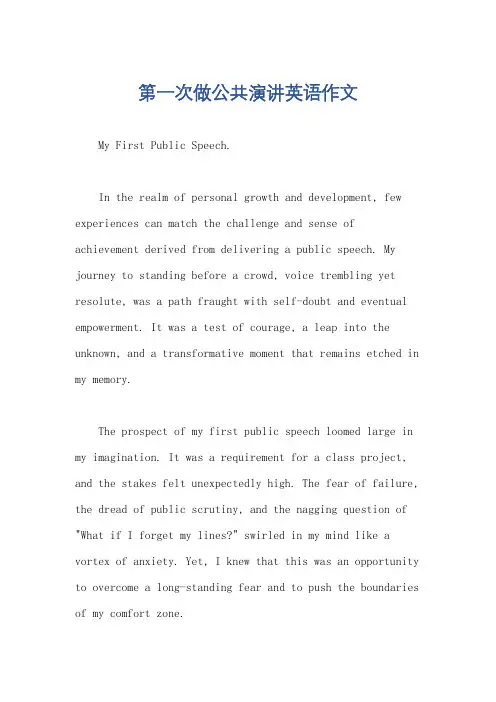
第一次做公共演讲英语作文My First Public Speech.In the realm of personal growth and development, few experiences can match the challenge and sense of achievement derived from delivering a public speech. My journey to standing before a crowd, voice trembling yet resolute, was a path fraught with self-doubt and eventual empowerment. It was a test of courage, a leap into the unknown, and a transformative moment that remains etched in my memory.The prospect of my first public speech loomed large in my imagination. It was a requirement for a class project, and the stakes felt unexpectedly high. The fear of failure, the dread of public scrutiny, and the nagging question of "What if I forget my lines?" swirled in my mind like a vortex of anxiety. Yet, I knew that this was an opportunity to overcome a long-standing fear and to push the boundaries of my comfort zone.Preparing for the speech was a rigorous process. I spent countless hours researching, outlining, and refining my topic. I practiced in front of mirrors, recorded myself, and even delivered mock speeches to my family and friends. Each time, I noticed improvements, but the butterflies in my stomach never fully subsided.The day of the speech dawned bright and clear, but my nerves were anything but. As I walked into the auditorium, the buzz of conversation and the expectant.。

英语公共演讲自我介绍Self-Introduction for Public Speaking in English.Ladies and Gentlemen,。
Good day! It's an honor to be standing here before you all, sharing a glimpse into my world. My journey has been diverse, filled with challenges and opportunities that have shaped me into the person I am today.My story begins in a small town, where the streets were familiar and the people were kind. I grew up surrounded by the love of my family and the warmth of my community. My parents instilled in me the values of hard work, honesty, and perseverance. They taught me that success is not final and failure is not fatal. These principles have guided me throughout my life.Education has always been a passion for me. I believeit is the greatest equalizer and the most powerful tool fortransformation. My academic journey has been a blend of challenges and achievements. I have excelled in my studies, finding joy in the pursuit of knowledge and the excitementof discovery. My academic background has provided me with a solid foundation in various fields, equipping me with the skills and knowledge to navigate the complexities of the modern world.Outside the classroom, I have been actively involved in various extracurricular activities. I have participated in sports, cultural events, and volunteer work. These experiences have not only allowed me to develop my leadership skills but have also taught me the importance of teamwork, dedication, and service to others. They havegiven me a chance to connect with people from different backgrounds, broadening my perspective and enriching my understanding of the world.My professional journey has been equally rewarding. I have worked in diverse industries, gaining valuable experience and insights. Each role has presented its unique challenges and opportunities, allowing me to grow and learn.I have leveraged my skills and expertise to make meaningful contributions to the organizations I have been part of.My strengths lie in my ability to adapt to new environments and situations. I am a quick learner, eager to embrace change and seize opportunities. My communication skills have allowed me to connect with people effectively, building bridges and fostering collaboration. My problem-solving abilities have been honed through years of facing challenges and finding innovative solutions.However, I believe that my greatest strength lies in my resilience. I have faced setbacks and failures, but I have always emerged stronger and wiser. I believe that every failure is an opportunity for growth, and I am committed to learning from my mistakes and using them as stepping stones to success.As I look ahead, I am excited about the opportunities that lie ahead. I am eager to continue learning, growing, and making a positive impact in the world. I believe that with the right attitude and perseverance, anything ispossible.In conclusion, I would like to thank you all for giving me this opportunity to share my story. It has been an honor to stand here and connect with you. I hope that my journey has inspired you to pursue your dreams and to never give up on yourself. Thank you for listening, and I look forward to the opportunities that lie ahead.Ladies and Gentlemen, it's been a pleasure sharing my story with you. Thank you for your time and attention. I wish you all the best in your endeavors and hope to meet you again soon.。
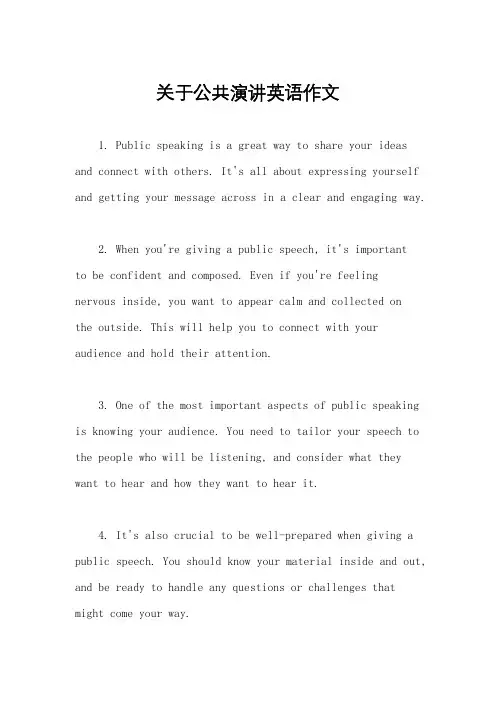
关于公共演讲英语作文1. Public speaking is a great way to share your ideas and connect with others. It's all about expressing yourself and getting your message across in a clear and engaging way.2. When you're giving a public speech, it's importantto be confident and composed. Even if you're feelingnervous inside, you want to appear calm and collected onthe outside. This will help you to connect with your audience and hold their attention.3. One of the most important aspects of public speaking is knowing your audience. You need to tailor your speech to the people who will be listening, and consider what they want to hear and how they want to hear it.4. It's also crucial to be well-prepared when giving a public speech. You should know your material inside and out, and be ready to handle any questions or challenges that might come your way.5. Another key element of public speaking is using body language and vocal variety to keep your audience engaged. You want to use gestures, facial expressions, and changesin tone to emphasize your points and keep the energy up in the room.6. Finally, remember that public speaking is a skill that takes practice. The more you do it, the more comfortable and effective you'll become. So don't be afraid to put yourself out there and keep honing your public speaking abilities.。
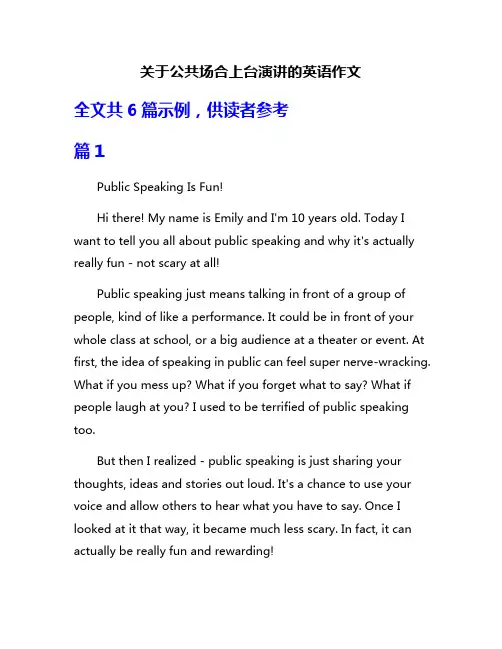
关于公共场合上台演讲的英语作文全文共6篇示例,供读者参考篇1Public Speaking Is Fun!Hi there! My name is Emily and I'm 10 years old. Today I want to tell you all about public speaking and why it's actually really fun - not scary at all!Public speaking just means talking in front of a group of people, kind of like a performance. It could be in front of your whole class at school, or a big audience at a theater or event. At first, the idea of speaking in public can feel super nerve-wracking. What if you mess up? What if you forget what to say? What if people laugh at you? I used to be terrified of public speaking too.But then I realized - public speaking is just sharing your thoughts, ideas and stories out loud. It's a chance to use your voice and allow others to hear what you have to say. Once I looked at it that way, it became much less scary. In fact, it can actually be really fun and rewarding!The first time I had to speak in front of my whole class, I was shaking like a leaf. My palms were sweaty and my heart was pounding out of my chest. But my teacher gave me some great tips that helped a ton.First, she said to pick a topic I was truly interested in and passionate about. That made it easier because I already knew a lot about the subject. I chose to talk about my favorite book series, Harry Potter. Reading those books was my absolute favorite thing, so I had a lot to say!Secondly, she said to practice out loud, either in front of a mirror or to my family at home. That helped me get comfortable with the words and flow of my speech. I actually memorized some parts, which boosted my confidence.The big day arrived, and I was still pretty nervous. But I tried to see it as a fun challenge, not something to be afraid of. I focused on making eye contact, speaking slowly and clearly, and just pretending I was talking to a group of friends. About halfway through, I started to relax and could sense the audience was interested and following along. That made me feel so proud!Once it was over, I got a huge round of applause. My classmates congratulated me and said I did an awesome job. The feeling of accomplishment was amazing. All the buildup andnerves were worth it in the end. Public speaking is definitely a skill that takes practice, but it gets easier and more fun the more you do it.Since that first class speech, I've had lots of opportunities to public speak. I've told stories at family gatherings, recited poems at school events, and explained my science fair project to judges.I even did a short talk at my grandpa's retirement party about what a great role model he's been. With each experience, I get a little more comfortable projecting my voice, minimizing nervous habits like saying "umm" too much, and just being myself in front of a crowd.There are so many benefits to becoming a strong public speaker too. It helps boost self-confidence and teaches valuable skills like organizing your thoughts, projecting your voice, making eye contact, and thinking on your feet. Those abilities can help in all areas of life, like interviewing for a job or just conversing with others. Plus, it's honestly just really fun and rewarding to share your stories, knowledge and perspectives through the art of public speaking.My best advice is to not let the fear of public speaking stop you from doing it. The more you face that fear head-on, the smaller it becomes. Prepare thoroughly, focus on engaging youraudience, and have fun with it. Before you know it, thoseonce-petrifying jitters will feel more like excited butterflies. Public speaking can seem super intimidating, but it's also an incredible chance to exercise your voice and share your brilliant mind with others.The ability to effectively communicate and share ideas through public speaking is such a valuable life skill. The more you practice it, the more opportunities will open up. You never know - keeping at it could lead to some awesome experiences down the road, like giving a big speech, performing, or even pursuing a career that involves public speaking. The world needs more awesome voices, creative minds and compelling stories. Don't be afraid to let yours be heard!So what are you waiting for? Pick a topic you're excited about, draft up a speech or presentation, and go for it! Public speaking is your chance to truly shine. I guarantee once you get some experience under your belt, you'll be saying the same thing as me - public speaking is fun!篇2My First Big SpeechWow, I can't believe I have to give a speech in front of the whole school next week! When my teacher Ms. Johnson told our class about the opportunity to speak at the upcoming assembly, I got butterflies in my stomach. Public speaking is so scary! But I really want to do it because the topic is "What I Want to Be When I Grow Up" and I have the perfect career in mind.Ever since I was a little kid, I've wanted to be a zookeeper. I love animals so much! My room is filled with stuffed animal toys of every kind - lions, elephants, dolphins, you name it. We even have two dogs at home, a golden retriever named Buddy and a tiny poodle named Coco. Taking care of pets is my favorite responsibility.I think working at a zoo caring for the amazing creatures would be the best job ever. Can you imagine getting to hang out with lions, tigers, and bears all day? Or feeding the towering gentle giants, the giraffes? Or teaching visitors all about each animals' habits and behaviors? I've watched so many shows on Animal Planet about the duties of zookeepers and it looks like a dream come true for an animal lover like me.The idea of speaking in front of so many people at school makes me really nervous though. Just thinking about walking up on that big stage in the auditorium with everyone's eyeswatching me gives me shivers. What if I mess up my words or freeze up in front of the microphone? Kids can be pretty mean sometimes and I don't want anyone laughing at me. I've never had to talk in front of a crowd that big before besides doing little presentations for my class.To get ready, I've been practicing my speech over and over again in front of a mirror. My parents and my big sister have listened to me run through it a bunch of times too to help me feel more comfortable. They keep encouraging me saying it will be a piece of cake once I get started. I'm memorizing the whole thing word-for-word so hopefully I don't blank out on stage.Ms. Johnson also let our class do a few practice rounds of public speaking this week which has been super helpful. We each picked a simple topic like our favorite food or hobby and then took turns getting up in front of the room to present for a few minutes. It was good practice projecting my voice loud and clear so everyone could hear me easily.I'm trying my best not to be scared and just focus on how exciting this is. Not every kid gets the chance to speak at anall-school assembly! If I do a good job, who knows, maybe I'll even get to be the student speaker at middle school graduation in a few years. That would be so cool. No matter what, it's animportant life skill to learn how to confidently speak in front of others.When I'm feeling really nervous, I just imagine myself as an adult zookeeper introducing an amazing new animal to all the visitors. "Gather round everyone, this is Samson, our new lion who just arrived from Africa," I picture myself announcing proudly over the microphone. The crowd goes wild over getting to see the powerful king of the jungle up close. See, speaking in front of people won't be so scary when I'm doing what I love most - teaching about animals!Well, my big speech is just a few days away now. I've got my favorite lion t-shirt all picked out to wear. My notecards with my talking points are memorized front and back. And I'm trying to channel all mybraver篇3Public Speaking: Overcoming the ButterfliesHave you ever had to stand up in front of your whole class and give a presentation? Or maybe you've had to speak at a school assembly in front of all the teachers and students? If so, you know that feeling – the butterflies start fluttering in your tummy, your palms get sweaty, and your heart beats really fast.Public speaking can be scary, but it's also a really important skill to learn.Why Is Public Speaking Important?Being able to speak clearly and confidently in front of a group is a useful skill for all sorts of situations. Maybe you'll need to give a book report or present a science project to your class. Or perhaps you'll want to run for student council and have to make a speech about why you'd be a great class representative. As you get older, you might have to give presentations for school projects or even interviews for jobs or colleges. Learning how to be a good public speaker now will help you feel more confident and prepared later on.Even if you don't plan on becoming a teacher, lawyer, or politician – careers where public speaking is really important –being able to express your ideas and feelings out loud is valuable. It can help you make new friends, stand up for yourself, and share your knowledge with others. Who knows, you might even discover that you really enjoy public speaking and want to join the debate team or become an actor!Common Public Speaking FearsIf the idea of public speaking makes you nervous, you're definitely not alone. Lots of people, even grown-ups, get stage fright. Here are some of the most common fears about public speaking:Being embarrassed or making a mistake in front of peopleForgetting what you're supposed to sayNot being able to answer questions from the audienceWorrying that people will judge you or think you sound sillyGetting distracted by noises or movements in the roomThese are all understandable worries. Public speaking puts you in a situation where all eyes are on you, which can feel uncomfortable or stressful. The good news is that with some practice and preparation, you can learn to manage your fears and become a confident, poised speaker.Tips for Conquering Stage FrightHere are some strategies that can help you feel more at ease when speaking in public:Practice, practice, practice. The more you rehearse your speech or presentation out loud, the more comfortable andnatural you'll feel. Practice in front of a mirror, your family, or some friends so you get used to having an audience.Prepare thoroughly. Make sure you understand your material really well and have clear notes or an outline to refer to. Knowing your stuff inside and out will boost your confidence.Visualize success. Spend a few minutes before you speak picturing yourself staying calm and giving a great presentation. Imagine the audience smiling, nodding, and listening attentively.Do some deep breathing. Taking a few slow, deep breaths can help relax your body and mind when you start feeling jittery.Start strong. Having a powerful opening line orattention-grabbing first few sentences will help you project your voice with energy and conviction right from the start.Focus on your material, not the audience. While you're speaking, keep your eyes on your notes or the screen displaying your visuals. Avoiding direct eye contact initially can be less intimidating.Remember, people want you to succeed! The audience is on your side and wants to hear what you have to say. They'll be impressed that you're brave enough to speak in front of them.One of the best ways to get over your fear of public speaking is to start doing it when you're young. Taking opportunities to do presentations or speeches in school will get you used to being in front of a crowd. The more practice you get now, the more confident and comfortable you'll become as an adult.So next time you have to give a book report or speech for class, don't panic! See it as a chance to work on an important life skill that will benefit you for years to come. With thorough preparation and a positive attitude, you CAN overcome the public speaking butterflies. You've got this!篇4Public Speaking: A Big Challenge for Little MeGiving a speech in front of a lot of people is one of the scariest things I can think of. Just the thought of standing up on stage with everyone's eyes on me makes my stomach doflip-flops. My palms get sweaty, my legs feel like jelly, and my mind goes blank. How am I supposed to remember all the things I've practiced when I'm that nervous?Last year, my teacher Mrs. Wilson asked our class to prepare short speeches about our favorite books. I chose "Charlotte's Web" by E.B. White because I love the story of the friendshipbetween Wilbur the pig and Charlotte the spider. When it was my turn to present, I froze up as soon as I stepped onto the stage.I stared out at my classmates and their parents, and suddenly I couldn't remember a single word of my speech! After what felt like forever, Mrs. Wilson gently prompted me and I was able to start speaking, but I rushed through my presentation and messed up some of the details about the book. It was so embarrassing!After that experience, I hoped I would never have to speak in public again. But then a few months ago, my drama teacher announced that our drama club would be putting on a play this spring. Of course, everyone in the club would have to memorize lines and perform on stage in front of an audience. My heart sank - there was no way I could do that after my disastrous book report!But I really wanted to be in the play because I love acting and pretending to be different characters. So I decided to face my fear of public speaking head-on. I talked to Mrs. Roberts, the drama teacher, and she gave me some great tips for controlling my nerves. First, she said to practice my lines over and over until I knew them backwards and forwards. The more prepared I was, the less likely I would be to freeze up from anxiety.She also suggested doing breathing exercises before going on stage. Taking slow, deep breaths from my diaphragm helps calm my mind and body when I'm feeling stressed. Mrs. Roberts showed me how to inhale for a count of four, hold my breath for four counts, then exhale for four counts. Doing this a few times really does make me feel more relaxed!Another smart idea she had was to pick a spot on the back wall to focus my eyes on while I'm performing. That way, I'm not distracted by all the individual faces in the audience. I can kind of zone out and get into my character instead of worrying about all those people watching me. Brilliant!The most important thing, though, is to remember that nobody is perfect - it's okay if I make a mistake here and there during my performance. The world won't end, and everyone understands that putting on a play is really hard work. As long as I've practiced diligently and given it my best effort, that's what matters most. The show must go on, slip-ups and all!So with Mrs. Roberts' guidance, I've been hard at work rehearsing my lines for the play every single day after school. I've also been practicing my breathing techniques and using the focus trick during our dress rehearsals on stage. I'm definitelymaking progress at controlling my stage fright, but I still get a few butterflies in my stomach when I picture opening night.What If I totally bomb during the actual performance? What if my mind goes blank again and I forget all my lines? Or what if I accidentally say someone else's lines instead of my own? Or trip and fall off the stage?? My heart starts pounding just thinking about all the things that could go wrong.But then I remember what my dad always tells me: Feel the fear and do it anyway! He says being scared is just part of trying new, challenging things. The important thing is not letting that fear stop me from going after my dreams and doing what I love. And I really do love acting - it makes me come alive in a way nothing else can.So I'm going to take a deep breath, dig down deep for my courage, and step out onto that stage with confidence. This is my chance to face my biggest fear and show everyone (but mostly myself) that I can do hard things, even if they terrify me at first. Who knows, maybe after this play is over, I'll be brave enough to try out for the lead role next time!篇5Public Speaking: Facing Your Fears and Finding Your VoiceHave you ever felt your heart racing, your palms sweating, and your knees shaking at the thought of standing in front of a crowd and speaking? Well, you're not alone! Public speaking is one of the most common fears people have, and it's perfectly normal to feel nervous about it. But guess what? With a little practice and some helpful tips, you can become a confident public speaker too!I remember my first experience with public speaking. It was in the third grade, and our class was putting on a play for the school. I had been chosen to play the lead role, and I was both excited and terrified. As the big day approached, my stomach felt like it was filled with a million butterflies, and I kept worrying that I would forget my lines or trip on stage.But my teacher, Mrs. Johnson, gave me some great advice. She told me to take deep breaths, picture the audience in their underwear (which always made me giggle), and remind myself that everyone in the audience was on my side and wanted me to do well. She also encouraged me to practice, practice, practice until I knew my lines like the back of my hand.The day of the play arrived, and as I stepped onto the stage, my knees were still shaking a little, but I took a deep breath and remembered Mrs. Johnson's words. And you know what? I nailedit! The audience clapped and cheered, and I felt so proud of myself for facing my fear and giving it my all.Since then, I've had many opportunities to speak in front of groups, whether it was presenting a project in class, giving a speech at a school assembly, or even just answering a question during a discussion. And each time, I've tried to remember the lessons I learned from that first experience.One of the most important things I've learned is the power of preparation. When you know your material inside and out, it's much easier to feel confident and relaxed. I like to practice my speeches or presentations out loud, either in front of a mirror or with a friend or family member listening. That way, I can get used to the sound of my own voice and work on things like pacing, volume, and gestures.Another key to successful public speaking is making eye contact with your audience. It might feel scary at first, but looking around and making eye contact with different people in the crowd helps you connect with them and keeps them engaged. It's like having a conversation with each person, instead of just talking at a group.And don't be afraid to use visual aids or props if they'll help get your point across. Whether it's a PowerPoint presentation, aposter, or even just a few index cards with notes, having something to refer to can help you stay on track and feel more prepared.Public speaking is a skill that takes practice, but it's also an incredibly valuable one to have. Being able to clearly and confidently communicate your ideas and thoughts can help you in so many areas of life, from school presentations to job interviews to just expressing yourself in everyday conversations.So, the next time you're asked to speak in front of a group, don't let fear hold you back. Remember to prepare, make eye contact, use visual aids if you need them, and stay calm if you make a mistake. And most importantly, believe in yourself and your ability to find your voice and share your ideas with the world.Public speaking might seem scary at first, but with a little practice and the right mindset, it can actually be a lot of fun! Just imagine the sense of accomplishment you'll feel when you've conquered your nerves and delivered a speech or presentation that you're truly proud of. Trust me, it's worth it!篇6Giving a Speech is Scary but Fun!Speeches are something that grown-ups do a lot, like when teachers talk in front of the class or when someone makes a big announcement at a ceremony. But sometimes, even kids like me have to give speeches too!Last month, I had to give a speech in front of my whole school at the annual Talent Show. I was really nervous about it at first. My heart was pounding, my hands were shaking, and I felt like I might throw up from being so scared! Public speaking is definitely one of the scariest things for me.It all started a few weeks before the Talent Show when my teacher, Mrs. Johnson, asked if any of us wanted to give a short speech to introduce one of the acts. I really loved doing the School Talent Show every year and watching all the amazing performances, so I raised my hand without even thinking about it. Mrs. Johnson smiled and said "Wonderful! Sarah will give the introduction speech."As soon as I heard those words, I got butterflies in my stomach. Me? Give a speech? In front of the whole school? Over 500 people?! What was I thinking raising my hand like that? I wasn't ready for this!For the next few weeks leading up to the Talent Show, I spent a lot of time practicing my speech. I wrote it out verycarefully, making sure to introduce the Dance Club's hip-hop performance in an exciting way. I said the words over and over again, looking at myself in the mirror or pretending my stuffed animals were the audience. My parents and big sister Sophia helped me practice too, giving me tips on speaking clearly and projecting my voice.Even after practicing so much, I was still really nervous when the night of the Talent Show finally came. As I looked out from behind the curtain at the huge crowd, my mind went blank. I couldn't remember a single line from my speech! Luckily, Mrs. Johnson was there backstage to remind me to take some deep breaths. She told me I was going to do great and that she believed in me.Finally, it was my turn to step out on stage. The spotlight was so bright that I could barely see the audience. I gripped the microphone tightly as I looked down at the speech printed out on notecards in my shaking hands. Then I began to speak."Hello everyone, and welcome to the 25th Annual School Talent Show!" My voice squeaked a little at first from nerves, but I kept going. "Tonight you'll see performances from some of the most talented students here at Madison Elementary. But first,please give a warm welcome to our amazing Dance Club who will wow you with an incredible hip-hop routine!"The crowd started clapping and cheering, giving me a boost of confidence. I made it through the rest of my speech without any big mistakes, introducing the Dance Club and getting everyone excited for their performance. When I finished speaking, the applause from the audience made me feel so proud!Even though getting up on stage had been absolutely terrifying at first, it ended up being really fun in the end. Sure, my hands shook a little and I messed up one of the lines slightly. But I didn't pass out or forget my speech completely like I was scared I would. I smiled big and gave a bow as the Dance Club took the stage behind me.After the Talent Show was over, so many people - teachers, parents, even kids from other classes - came up to me and said how great my speech was. I felt like a rock star! Giving that speech, as scared as I was, ended up being one of the most rewarding experiences I've ever had.Public speaking is still very nerve-wracking for me, but I now know that I can do it. I'm proud that I faced one of my biggest fears and pushed through. Next time I have to give a speech, I'lljust think back to that night at the Talent Show and remember how great it felt to overcome my nerves. Who knows, maybe public speaking will even become one of my talents someday!。
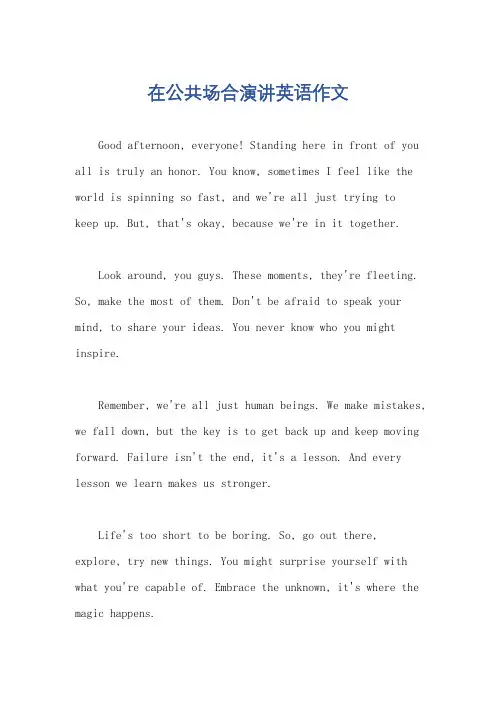
在公共场合演讲英语作文Good afternoon, everyone! Standing here in front of you all is truly an honor. You know, sometimes I feel like the world is spinning so fast, and we're all just trying tokeep up. But, that's okay, because we're in it together.Look around, you guys. These moments, they're fleeting. So, make the most of them. Don't be afraid to speak your mind, to share your ideas. You never know who you might inspire.Remember, we're all just human beings. We make mistakes, we fall down, but the key is to get back up and keep moving forward. Failure isn't the end, it's a lesson. And every lesson we learn makes us stronger.Life's too short to be boring. So, go out there, explore, try new things. You might surprise yourself with what you're capable of. Embrace the unknown, it's where the magic happens.Lastly, don't forget to smile. Even when things get tough, a smile can brighten up the darkest day. It's a simple gesture, but it has the power to change someone's mood, maybe even their life.So, that's it from me. Keep moving, keep smiling, and never stop learning. Thank you all for being here, and have a great day!。
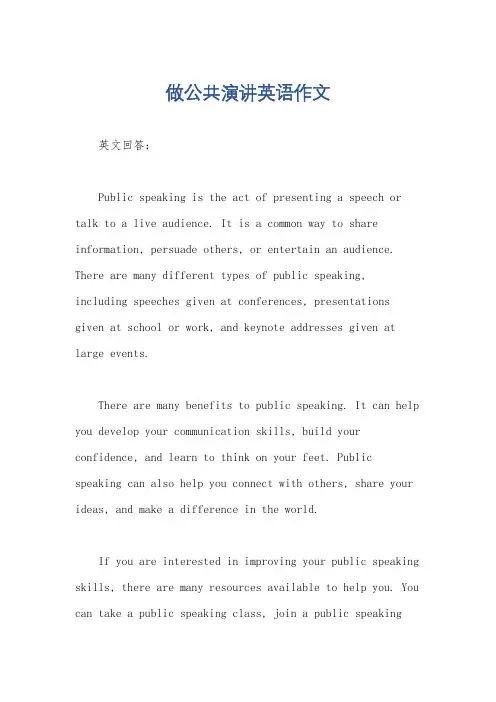
做公共演讲英语作文英文回答:Public speaking is the act of presenting a speech or talk to a live audience. It is a common way to share information, persuade others, or entertain an audience. There are many different types of public speaking,including speeches given at conferences, presentations given at school or work, and keynote addresses given at large events.There are many benefits to public speaking. It can help you develop your communication skills, build your confidence, and learn to think on your feet. Public speaking can also help you connect with others, share your ideas, and make a difference in the world.If you are interested in improving your public speaking skills, there are many resources available to help you. You can take a public speaking class, join a public speakingclub, or find a mentor who can provide guidance and support. There are also many books and articles available on public speaking that can help you learn the basics and improveyour skills.中文回答:公共演讲指的是向现场听众发表演讲或谈话的行为。

公共英语演讲范文Introduction to the Course – Public SpeakingGood ladies, morning and gentlemen. What’s wrongDid you realize I just made a mistake in my greetingYou may wonder why I would make such a silly mistake. You tell me why. Well, I was kind of nervous. Now you may wonder how e a teacher of my age would feel nervous facing the students. To tell you the truth, all the public speakers, including most eloquent ones like Barak Obama, Ronald Reagan, would feel nervous on the stage. And more often than not, nervousness may well make speakers mit silly blunders. This is caused by what we call stage fright/fear.As a veteran teacher of English I find Chinese students usually feel reluctant to make a public speech whether in Chinese or in English. The main reason for this is Stage Fright, because they are not or less trained in delivering a public speech. You may have the impression that foreigners especially Americans are good at talking, particularly in public. This is because Public Speaking is a pulsory course in most of the American universities. As a matter of fact, kids are encouraged to make presentationsin class even in their primary schools. So to help you overe this barrier, we opened this course four years ago and this is the fifth round.For t he next 30 minutes, I’d like to specify 4 things related to the course. They are five purposes of opening this course; the way the class will be conducted and the teaching schedule; the requirements for you to meet; and the position of the final score.Let’s start with the five purposes, the first of which is to help you acquire the basic skills in preparing and delivering a speech effectively. There are nine things to keep in mind in this regard.1. How to choose a topic. If it is a classroom presentation and your audiences are your fellow students, you need to select an appropriate topic to attract them. But in future you don’t have to choose a topic as, most likely, you will be asked to talk about a particular subject, unless you want to enter for a speech contest.2. How to write an outline of a speech. Actually in most cases you are supposed to write two outlines, one is called preparation outline, which is more detailed and is done for the writing of your speech; the other is called speaking outline, which is brief and used for the delivery of your speech.3. How to organize a speech. In organizing a speech you need to know what to say in the introduction, how to balance the main points in the body and what to say in the conclusion.4. How to make your vocal language more effective. You have to watch five aspects: pronunciation, vocal variety, rhythm, fluency, and volume.5. How to use verbal language effectively. In this aspect, you will learn to make good choice of words, and use appropriate grammar and rhetorical devices.6. How to use non-verbal language effectively. This includes such elements as eye contact, facial expression, gestures, and posture. Among these, eye contact is the most important.7. How to use visual aids in an effective way. For visual aids, you are supposed to use ppt. only, and oasionally a short video clip which should last no longer than 1 minute.8. How to practice and rehearse for a speech. Enough practice and rehearsal will ensure you a suessful speech.9. How to prepare answers to possible questions from the audience. Afterthe speech, the speaker should be ready to take questions from the audience. The speaker should prepare answers to possible questions before delivering the speech.The second purpose is to help you find and then overe your problems in making a public speech. As some of you might already have known, our course is practice-oriented, which means you are supposed to make a lot of presentationsafter learning the theory and watching samples. However,for most of the time you will be audience only. As audience, you will find the problems of the speakers as it’s human nature to find faults with others. I want you to be particular or picky while listening and get ready to make ments. By analyzing the speeches of others, you will consciously avoid similar mistakes in your own performance and consequently perfect your own speeches.Now let’s e to the third purpose, which is to help you overe stage fear. Stage fear ranks very high on the list of all fears aording to some statistics. I remember reading an article saying the stage fear ranks the second among allthe human fears. As I said in the introduction, everyonehas stage fright, no matter how experienced he/she is. In other word s, it’s perfectly normal to feel nervous when standing on a platform facing a relatively large audience. To overe stage fear, there are at least five effective ways, namely, acquiring speaking experience, making full preparation, thinking positively, using the power of visualization and not expecting perfection. Although this course only allows you two opportunities for practice in class, you will have to practice dozens of times outsidethe classroom before each presentation. Whether you can doa good speech in class largely depends on how well you practice before the class. Full preparation includes thepreparation of the outline, the speech draft, the practice and rehearsal with the help of speaking outline. When you are actually standing on the platform, tell yourself “Ican do it, I will make it,” instead of saying either to yourself or to the class, “I am too nervous. I will not be able to make it” You should visualize yourself as a suessful speaker, with the audience applauding and cheering. Lastly, never expect to be perfect. Nothing is perfect, no one is perfect. In other words, tolerate your shortings and oasional errors. Remember your actual performances usually will not surpass your practice in rehearsal.Purpose number four is to help you prepare for your future academic and professional life. Some day you will e across the situations where you are required to make apublic speech whether you stay in school or work in other social institutions. For now, classroom presentations are what you face while you are in college. And seminars and symposiums are oasions for yourfuture academic studieswhere you are very likely to be asked to make a presentation, while oral thesis defenses are what you will have to go through before your graduation. In your future professional life, you are likely to be asked to write and present business or work reports or promote products to clients. And it is not unlikely that a few of you will turn to politics in the future, in which case skills of publicspeaking would appear exceedingly important. Besides, inthe globalization environment, with the cross-cultural intermunication growing rapidly, there will be oasionswhere you will attend ceremonies of various kinds and makea speech.Here es the last purpose, which is to help you build confidence and advance your personal image. Through practicing and training, you may improve your way of municating your ideas orally to a group of people, whichwill naturally help boost your confidence. And the abilityto beautifully deliver a speech in public will undoubtedly upgrade your self-image and will make you more popular anywhere you go.Ok, those are the five main purposes of opening this course. Some of you may wonder why I didn’t include “to help students practice their spoken English”. Well, spoken English is another course, as having a conversation is different from making public speeches. As a matter of fact, a relatively better mand of oral English is required of those who want to take this course. In a way, it’s mor e a speech course than a language course. Now let’s move on to how this course will be conducted and the teaching schedule.First, this course will integrate theory into practice, with focus on practice. To be more exact, the first four classes will be devoted to theory. The theory will be basedon the lecture notes which you’ll find in our class email box. (I’ll show it to you later.) The lecture notes are based on the book The Art of Public Speaking by Stephan Lucas. And we’ll illustrate the theory wit h examples, either verbal or visual. After the first few weeks of theory learning, volunteers will be assigned a speech, upon which I’ll make some ments in order to consolidate what you have just learned. The 2 sample speeches will take two classes.Second, the remaining 10 classes will be used for classroom presentation. Each student is required to give two speeches, one is informative, the other persuasive. Four students will make speeches each week. Both teachers and students are to ment on their performances. Each speech is a 10-minute talk, followed by 10 minutes for Q & A and 2 minutes for grading.As you can see, more time will be spent on practice rather than on theory. That is why we call it practice-oriented. To make our practice more effective, you are supposed to meet some requirements.To make our class more effective and efficient, you are to fulfill the following 14 requirements.1. Don’t skip classes and don’t be late. Or you’ll be punished. In the latter part of the speech you’ll know how.2. Be attentive in class. In this class, you’ll play many roles other than a listener. You are also a questioner, mentator and a judge as well.3. Prepare and pose the speech well and well in advance. The platform is to the speakers what the stage to theactors and actresses. A minute on thestage means days of hard work off the stage.4. Every speech should be written yourself. You are not allowed to copy the whole thing from the inter. If you do quote something, you need to mention it in bibliography, which is supposed to be displayed at the end of a speech.5. Practice and rehearse fully until you can make the speech with confidence. Remember a lot of practice will always give a boost to your confidence.6. Don’t bring the spee ch draft or the preparation outline to the stage. You can make a speech with your speaking outline only.7. Limit your speech to ten minutes. Or the assessmentof your presentation will be affected.8. Don’t use too many slides in your ppt. 12 will suffice for a 10-minute talk.9. Don’t play any video clip that lasts longer than 1 minute.10. Hand in the preparation outline a week before your speech. Be sure it is the printed work instead of thehandwritten one. Meanwhile, your speech draft and speaking outline are supposed to be submitted on line a week before the performance. A record will be kept about the time of submission. And late submission is not allowed.11. Try to look at the audience and make eye contact as often as possible. This will contribute a lot to the scoring.12. Print your evaluation charts and bring them to class from the fifth week on. You are the judge, rememberYou need something to keep the record of each speech.13. Discuss others’ speeches with group mates and grade them carefully and fairly. Your class will be broken down into groups of 4 and the group leader is responsible for the calculation of the average score of each speaker.14. Don’t ask me to revise your score. In order to follow the principle of fai r play,don’t ask me to change your score for any reason.There might be some other requirements along the way. I’ll let you know when they e up. Now let’s look at the last main point which you might be more concerned about --- grading.The total score is posed of 3 parts: the first speech, 40% of the total score; the second, 45% (of each speech, your grading will aount for 30%, while mine, 70%); classperformance, 15%, including attendance and participation, with attendance aounting for 7 points, and participation 8 points. If you are absent from one class for no reason at all, one point will be deducted and if you are late for one class, half a point will be deducted. And you can’t e into the classroom until the end of one speech, that is, when you hear the applause. By participation we mean you have to be actively involved in Q&A and ment session. Your performance will be recorded based on the quality of your questions and ments.In terms of grading the speech, you need to know how to evaluate the performance of your fellow students. Nowlet’s look at the evaluation chart.Evaluation ChartClass Group DateName of speaker Name of evaluatorYou are required to grade the first 6 of the 7 items. Please note that each item has different percentage of the total score. Following are the descriptions of each item to be evaluated that you should pay attention to when grading.1. Vocal Effect includes pronunciation, vocal variety, fluency, clarity, volume, pacing (rhythm), among which vocal variety and pacing are the most important and so take a larger share of the grade.2. Verbal Language includes grammar, auracy, appropriateness, and vividness.3. Structure refers to the organization of a speech and effectiveness of each part, namely opening, body and ending.4. Body Language contains eye contact, gesture, facial expression, and posture.5. Visual Aid mainly includes ppt. or video clips. Each ppt. should have a limited number of slides, preferably 12 slides for a 10-minute speech.6. Overall Effect refers to the general impression a speech leaves on the audience. When grading this part, you should consider whether the speech is informative enough --- containing new, interesting, helpful information, or whether a persuasive speech is convincing enough --- including whether the speaker speaks with passion; whether the speaker uses rhetorical devices in the speech; whether you, as audience, are moved, inspired or persuaded and so on. This part also includes Q&A, where attention should be paid to whether the speaker understands the questions and repeats it to the audience and whether he/she answers the question satisfactorily and in a good manner.7. Outline is left for the teacher, that is, I will grade item 7 after you hand in your preparation outline.It is my great honor to be with you today for the mencement.First of all, please allow me, on behalf of all the graduate students, to show ourappreciation to all the teachers who have been teaching and guiding us in the past four years in this departmentand this school. Without your help, we would not make it here. Well, I have a suggestion here. All the graduate students please stand up.Teachers, please remain in your seats. Let’s give our warmest applause to our dearest teachers. Thank you. Take your seat please.Time flies! Four years have gone away in a blink. In these four years, the greeting party gave us warmth, the New Year party showed our passion, the writing contest cultivated our sentiment and the debate petition enhanced our logic. We experienced so much, and harvested so much.All these four years footprints have witnessed our growth. And then, step by step, we finally made it to the destination.Graduation is not the end; it is the beginning. Graduation is only a concept. In real life, every day you graduate. Graduation goes on until the last day of our life. Today is the day we graduate from Capital Normal University and today is also the day we step into the university of society. We are going to carry forward the traditions and make achievements for ourselves, our parents, our schooland our country. Here, my best wishes to every one of graduate student. We are confident that we are going to make it.Again we want to thank all the teachers and wish them all the best!Thank you. Thank you all very much!。
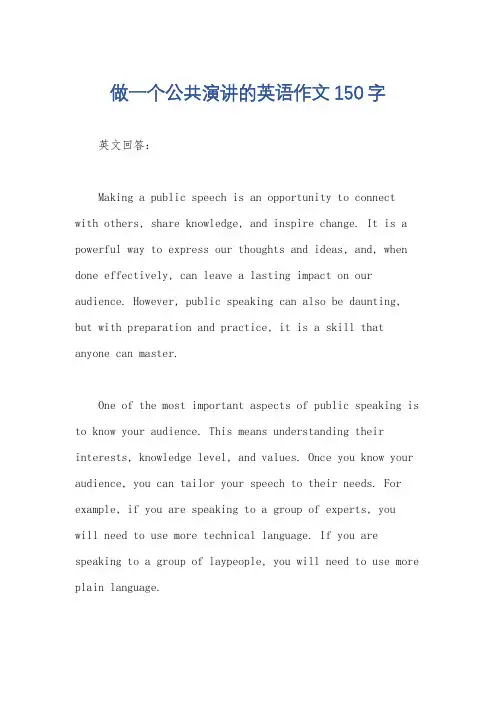
大学物理实验报告
电
阻
/
欧
姆
磁场强度/ 高斯
自由层
中间导电层被钉扎层钉扎层
7. 思考题及实验小结
思考题(1):什么是巨磁电阻效应?巨磁电阻结构组成有何特点?
答: ①巨磁电阻效应来自于载流电子的不同自旋状态与磁场的作用不同,因而导致电阻值的变化. ②如图所示,多层GMR结构中,无外磁场时,上下两层铁磁膜的磁矩是反平行耦合的.在足够强的外磁场作用下,铁磁膜的磁矩方向都与外磁场方向一致,外磁场使两层铁磁膜从反平行耦合变成了平行耦合.
思考题(2):试分析不同磁偏置影响电流测量灵敏度的原因是什么?
答:通过对比25mv U-I图与120mv U-I图的电流测量灵敏度(120mv灵敏度高于25mv),结合做实验时的实际操作(120mv 时永磁体小于25mv时永磁体与线圈间距),于是大胆猜测不
以下内容为报告保留内容,请勿填写或删除,否则影响实验成绩。
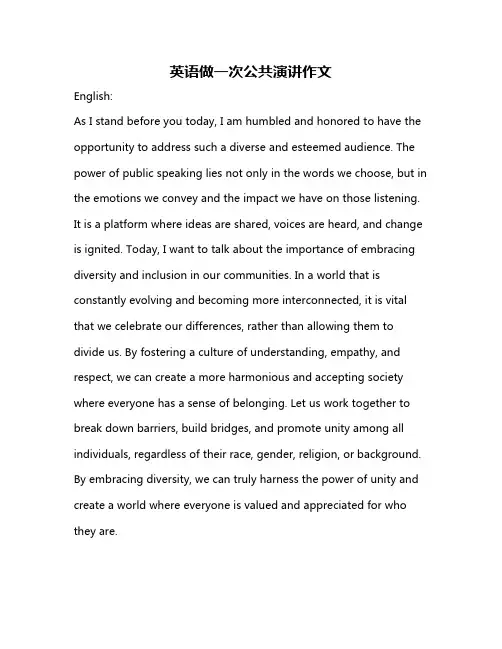
英语做一次公共演讲作文English:As I stand before you today, I am humbled and honored to have the opportunity to address such a diverse and esteemed audience. The power of public speaking lies not only in the words we choose, but in the emotions we convey and the impact we have on those listening. It is a platform where ideas are shared, voices are heard, and change is ignited. Today, I want to talk about the importance of embracing diversity and inclusion in our communities. In a world that is constantly evolving and becoming more interconnected, it is vital that we celebrate our differences, rather than allowing them to divide us. By fostering a culture of understanding, empathy, and respect, we can create a more harmonious and accepting society where everyone has a sense of belonging. Let us work together to break down barriers, build bridges, and promote unity among all individuals, regardless of their race, gender, religion, or background. By embracing diversity, we can truly harness the power of unity and create a world where everyone is valued and appreciated for who they are.Translated Content:今天站在你们面前,我感到自己既谦卑又荣幸,有机会与这么多不同背景的尊贵听众交流。
英语作文主题发表公共演讲The Art of Public Speaking.Public speaking is an essential skill that has the power to engage, inspire, and persuade. It is not merely about standing in front of a crowd and delivering words; it is an interactive performance that requires meticulous planning, careful execution, and a profound understanding of human psychology. This article delves into the nuances of public speaking, exploring its importance, challenges, and effective techniques to master the craft.Importance of Public Speaking.Public speaking is a key skill in almost every profession. Whether it's a business presentation, apolitical rally, or an academic lecture, the ability to communicate ideas effectively is crucial. It is a powerful tool for leadership, as it allows individuals to convey their vision, mission, and values to a larger audience.Furthermore, public speaking helps build confidence, enhances listening skills, and fosters critical thinking.Challenges of Public Speaking.Despite its importance, public speaking can be daunting for many. Fear of public speaking, known as glossophobia,is a common anxiety disorder. The pressure to perform, the fear of being judged, and the uncertainty of how the audience will react can be overwhelming. Other challenges include managing stage fright, staying engaged with the audience, and delivering a message that resonates.Effective Techniques for Public Speaking.1. Prepare Well: The foundation of any successful public speaking performance is thorough preparation. Research your topic, understand your audience, and create a clear outline of your speech. Practice your speech repeatedly to ensure fluency and confidence.2. Connect with the Audience: Establishing a connectionwith the audience is essential. Use stories, examples, and humor to engage them. Maintain eye contact, smile, and use appropriate body language to convey warmth and sincerity.3. Use Effective Language: Choose your words carefully. Use simple, clear language that is easy to understand. Avoid jargon and technical terms that may confuse the audience. Vary your sentence structure and use rhetorical questions to keep the audience engaged.4. Structure Your Speech: A well-structured speech is easier to follow and more impactful. Begin with anattention-grabbing introduction, followed by a clear main body that presents your ideas, and conclude with a powerful summation that leaves a lasting impression.5. Manage Stage Fright: Stage fright is normal, but it can be managed. Breathing exercises, visualization techniques, and positive affirmations can help calm your nerves. Remind yourself of your preparation and focus on the joy of sharing your message with the audience.6. Adapt to the Moment: Public speaking is an interactive process. Be prepared to adapt your speech based on the audience's response. If they seem engaged, you can delve deeper into a point. If they seem distracted, change the pace or introduce a new element to capture their attention.Conclusion.Public speaking is a craft that takes time, practice, and perseverance to master. It requires an understanding of human psychology, effective language use, and the ability to connect with an audience. By incorporating the techniques discussed in this article, anyone can improve their public speaking skills and become a confident, engaging speaker. Remember, public speaking is not just about delivering words; it's about creating moments that inspire, inform, and move people.。
做一个公共演讲主题的英语作文English:The theme of my public speech is about the importance of mental health awareness and destigmatization. In today's society, mental health issues are still widely misunderstood and stigmatized. This leads to lack of support and understanding for those who are struggling with mental illnesses. By raising awareness and promoting open conversations about mental health, we can reduce the stigma and encourage individuals to seek help without fear of judgment. It is crucial for us to understand that mental health is just as important as physical health, and that everyone deserves access to proper mental health care and support. Together, we can work towards creating a more inclusive and supportive environment for those affected by mental health issues.中文翻译:我公开演讲的主题是关于心理健康意识和去除社会污名化的重要性。
公共场所演讲英语作文Title: The Art of Public Speaking: Mastering the Stage。
Public speaking is an art form that transcends mere words; it is the ability to captivate, inspire, andinfluence an audience. Whether it's addressing a small gathering or speaking in front of a large crowd, mastering the art of public speaking is a valuable skill that canopen doors to countless opportunities.First and foremost, effective public speaking requires thorough preparation. Before stepping onto the stage, it's essential to know your audience, understand the purpose of your speech, and organize your thoughts in a coherent manner. Researching your topic thoroughly and gathering relevant information will not only enhance your credibility but also enable you to deliver a compelling message.Moreover, mastering the art of delivery is crucial fora successful public speech. This includes paying attentionto your tone, pitch, and pace of speech. A confident and engaging demeanor can significantly impact how your message is received by the audience. Practicing vocal exercises and utilizing appropriate body language can further enhance your delivery, making your speech more dynamic and memorable.In addition to delivery, effective public speakers understand the importance of connecting with their audience on an emotional level. Sharing personal anecdotes, using humor, or incorporating vivid imagery can help create a rapport with the audience and make your message more relatable. By evoking emotions and engaging the audience's attention, you can leave a lasting impression and inspire action.Furthermore, mastering the art of handling nerves is essential for any public speaker. It's natural to feel anxious before speaking in front of an audience, but learning to channel that nervous energy into enthusiasm can make all the difference. Techniques such as deep breathing, visualization, and positive self-talk can help calm yournerves and boost your confidence on stage.Moreover, embracing feedback and continuously seeking opportunities to improve is key to mastering the art of public speaking. Whether it's through formal training programs, joining Toastmasters clubs, or simply soliciting feedback from peers, every opportunity to refine yourskills will contribute to your growth as a speaker.In conclusion, public speaking is an invaluable skill that can empower individuals to communicate effectively and make a positive impact on the world. By mastering the art of preparation, delivery, emotional connection, nerve management, and continuous improvement, anyone can become a confident and persuasive public speaker. So, embrace the stage, unleash your voice, and let your words inspire and resonate with others.。
在公共场所演讲英语作文Title: The Art of Public Speaking.Public speaking, an ancient and venerable art, has always held a significant place in our societal fabric. It is a medium through which ideas are communicated, perspectives are shared, and leaders are forged. However, it is not merely the transmission of words; it's an intricate dance between the speaker, the message, and the audience.At its core, public speaking is about connecting with your listeners. It's about understanding their needs, their doubts, and their aspirations. It's about finding the common thread that binds your ideas to theirs, creating a shared experience that leaves them moved, informed, and perhaps even inspired.To master this art, one must first master oneself. Confidence is key. It radiates from within, infecting theaudience with a sense of trust and belief. A confident speaker is not afraid to take risks, to explore new ideas, to be vulnerable. This confidence comes from preparation, from knowing your subject matter intimately, from understanding your audience, and from repeated practice.The structure of a speech is also crucial. Just as a building needs a solid foundation, a speech needs a strong introduction that sets the tone and grabs the audience's attention. The body of the speech should build upon this foundation, presenting ideas in a logical and coherent manner. The conclusion, then, should tie everything together, leaving the audience with a lasting impression.Moreover, public speaking is an interactive process. A good speaker knows how to engage the audience, to invite their participation, to make them feel like active participants rather than passive listeners. This can be done through questions, anecdotes, or simply by maintaining eye contact and a warm smile.But public speaking is not just about the speaker; it'salso about the listener. A great speaker is always aware of the needs and expectations of their audience. They adjust their tone, their pace, even their content to keep the audience engaged and interested. They understand thatpublic speaking is a two-way street, a dialogue between the speaker and the listeners.In addition to these, public speaking requires a unique blend of creativity and adaptability. A speaker must beable to think on their feet, to improvise when necessary,to make the most of unexpected opportunities. Creativity,in this sense, is not just about being original or comingup with new ideas; it's about finding new ways to communicate old ideas, about making the familiar seem fresh and exciting.Finally, public speaking is about leaving a legacy.It's about leaving the audience with something to ponder, something to remember, something that inspires them to act. It's about creating moments that become turning points in people's lives, moments that they carry with them for years, moments that define them and shape their perspectives.In conclusion, public speaking is much more than just standing in front of a crowd and talking. It's an art that requires dedication, practice, and a continuous quest for improvement. It's about connecting with your audience, about sharing your ideas and passion, and about leaving a lasting impact. It's about becoming not just a speaker but a storyteller, a teacher, a leader, and an inspiration.。
什么是公共英语演讲稿公共英语演讲稿。
公共英语演讲稿是指在公共场合,以英语为主要语言进行演讲的文稿。
在现代社会,英语已经成为一种全球性的语言,具有广泛的使用范围和重要的国际交流地位。
因此,掌握一定的英语演讲能力对于个人的发展和国际交流至关重要。
在这篇文档中,我们将探讨什么是公共英语演讲稿,以及如何写好一篇公共英语演讲稿。
首先,公共英语演讲稿需要具备一定的结构和内容。
一个成功的演讲稿应该包括以下几个部分,开场白、正文、结尾致辞。
开场白需要引起听众的兴趣,可以通过一个引人入胜的故事、一个令人深思的问题或者一个引人注目的统计数据来引起听众的注意。
正文部分是演讲的核心,需要围绕主题展开,逻辑清晰,重点突出。
结尾致辞需要简洁明了,可以通过总结全文、呼吁行动或者留下深刻的印象来结束演讲。
其次,写好一篇公共英语演讲稿需要注意语言的选择和运用。
在演讲中,语言是沟通的桥梁,因此需要选择准确、生动、简洁的语言来表达自己的观点和情感。
避免使用过于复杂的词汇和句式,以免让听众产生困惑。
同时,要注意语气的把握,根据不同的主题和场合选择合适的语气,让听众产生共鸣。
最后,一篇成功的公共英语演讲稿需要具备一定的表达技巧和情感投入。
在演讲中,表达技巧是至关重要的,可以通过声音的抑扬顿挫、肢体语言的配合、眼神的交流等方式来增强演讲的效果。
同时,情感投入也是必不可少的,演讲者需要真诚地表达自己的情感,让听众感受到演讲的真诚和热情。
总之,公共英语演讲稿是一种重要的书面表达形式,它可以帮助演讲者更好地表达自己的观点和情感,增强演讲的说服力和感染力。
因此,我们需要认真对待公共英语演讲稿的写作,不断提高自己的表达能力和演讲技巧,以便在各种场合都能够自如地进行英语演讲。
希望通过本文的介绍,能够帮助大家更好地理解和写好公共英语演讲稿。
做一篇公共演讲英语作文Hello everyone! Today, I'm here to share a few thoughts that have been rattling around in my head lately.You know, sometimes life can feel like a maze with no clear path. But that's okay! The beauty of it all is thatwe're all unique, and we have the power to create our own way. Don't be afraid to take risks, because in the end,they're what shape us into who we are.And speaking of risks, let's talk about the power of saying "yes." How many times have we hesitated, afraid of the unknown? Well, here's my take: sometimes, the bestthings in life happen when we step out of our comfort zones. So, say "yes" more often, and watch your world expand.Now, I want to mention the value of listening. In this fast-paced world, we're constantly bombarded with information. But true wisdom comes from listening, not just talking. Listen to people's stories, their perspectives,and you'll learn more than you ever imagined. Oh, and don't forget to laugh!。